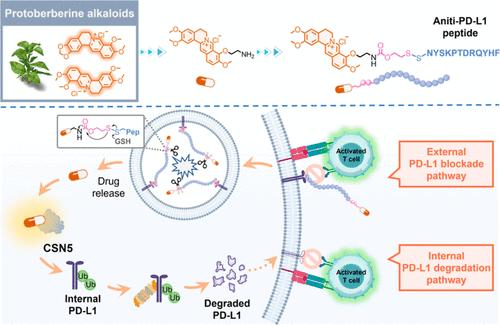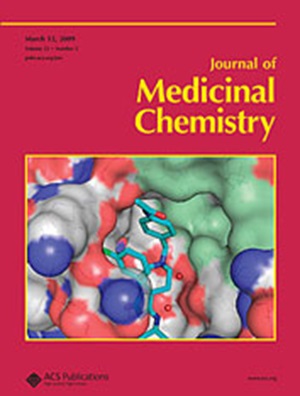Advancing Cancer Immunotherapy through Engineering New PD-L1 Degraders: A Comprehensive Study from Small Molecules to PD-L1-Specific Peptide–Drug Conjugates
IF 6.8
1区 医学
Q1 CHEMISTRY, MEDICINAL
引用次数: 0
Abstract
Despite the considerable achievements of antibodies targeting PD-1/PD-L1 in cancer immunotherapy, limitations in antitumor immune response and pharmacokinetics hinder their clinical adoption. Small molecules toward PD-L1 degradation signifies an innovative avenue to modulate PD-1/PD-L1 axis. Herein, we unveil a comprehensive engineering involving the development of new PD-L1 degraders based on the berberine (BBR) and palmatine (PMT) bioactive frameworks and explore their translational potential for cancer immunotherapy using a peptide-drug conjugate strategy. Chemical modifications at the O-9 position of PMT dramatically enhance the PD-L1 degradation capacity. Further conjugation of PMT degraders with an anti-PD-L1 peptide featuring disulfide linkers enables efficient GSH-specific prodrug activation, yielding synergistic immunotherapeutic benefits through both external PD-L1 blockade and internal PD-L1 degradation mechanisms. This work elucidates the compelling charm of the discovery and application of PD-L1 degraders, offering solutions to the challenges in advancing cancer immunotherapy in widespread clinics.

通过设计新的 PD-L1 降解剂推进癌症免疫疗法:从小分子到 PD-L1 特异性肽-药物共轭物的综合研究
尽管针对 PD-1/PD-L1 的抗体在癌症免疫疗法中取得了巨大成就,但抗肿瘤免疫反应和药代动力学方面的局限性阻碍了它们在临床上的应用。降解 PD-L1 的小分子药物是调节 PD-1/PD-L1 轴的创新途径。在此,我们揭示了一项综合工程,涉及基于小檗碱(BBR)和巴马汀(PMT)生物活性框架开发新的 PD-L1 降解剂,并利用肽-药共轭策略探索其在癌症免疫疗法中的转化潜力。对 PMT 的 O-9 位进行化学修饰可显著增强其降解 PD-L1 的能力。将 PMT 降解剂与具有二硫键的抗 PD-L1 肽进一步共轭,可实现高效的 GSH 特异性原药激活,通过外部 PD-L1 阻断和内部 PD-L1 降解机制产生协同免疫治疗效果。这项工作阐明了发现和应用 PD-L1 降解剂的魅力,为在广泛的临床中推进癌症免疫疗法所面临的挑战提供了解决方案。
本文章由计算机程序翻译,如有差异,请以英文原文为准。
求助全文
约1分钟内获得全文
求助全文
来源期刊

Journal of Medicinal Chemistry
医学-医药化学
CiteScore
4.00
自引率
11.00%
发文量
804
审稿时长
1.9 months
期刊介绍:
The Journal of Medicinal Chemistry is a prestigious biweekly peer-reviewed publication that focuses on the multifaceted field of medicinal chemistry. Since its inception in 1959 as the Journal of Medicinal and Pharmaceutical Chemistry, it has evolved to become a cornerstone in the dissemination of research findings related to the design, synthesis, and development of therapeutic agents.
The Journal of Medicinal Chemistry is recognized for its significant impact in the scientific community, as evidenced by its 2022 impact factor of 7.3. This metric reflects the journal's influence and the importance of its content in shaping the future of drug discovery and development. The journal serves as a vital resource for chemists, pharmacologists, and other researchers interested in the molecular mechanisms of drug action and the optimization of therapeutic compounds.
 求助内容:
求助内容: 应助结果提醒方式:
应助结果提醒方式:


